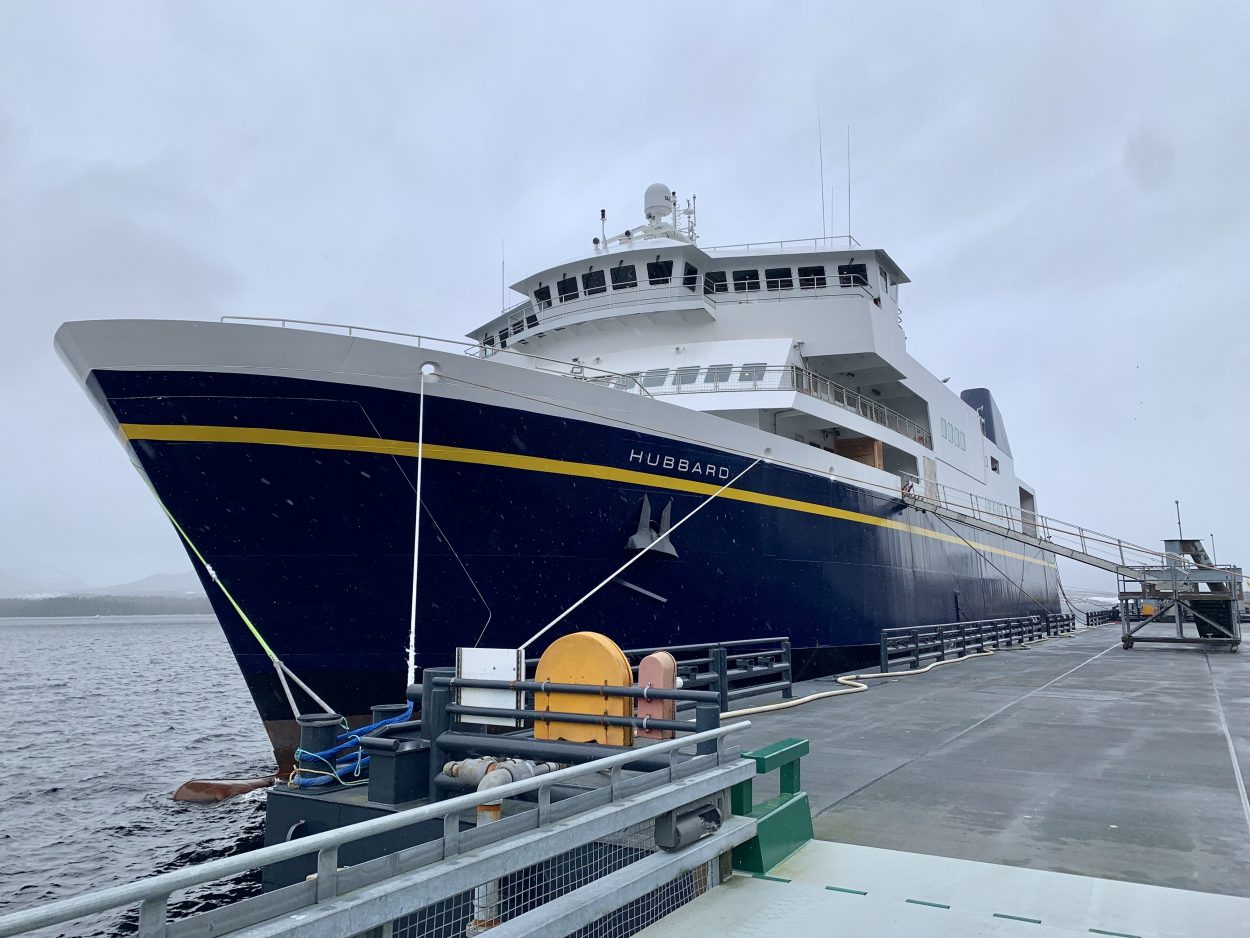
Gov. Mike Dunleavy on April 9, 2020. (Photo by Liz Ruskin/Alaska Public Media)
Governor Mike Dunleavy has proposed a new bill to boost independent oversight and planning for the Alaska Marine Highway System.
In a statement Wednesday, the governor says the legislation would improve reliability and efficiency of the fleet.
“As we continue efforts to restructure and modernize the Alaska Marine Highway System, it is imperative the long-term operations and finances are addressed,” the statement said. “Our goal remains the same, to create a more reliable and efficient marine highway system to serve coastal Alaska for years to come.”
Dunleavy, a Republican, has targeted the ferry system for deep budget cuts during his two years as governor. But the new bill is aimed at sharpening the marine highway’s strategy.
The legislation would also replace an existing marine transportation advisory board with a new panel required to draft regular short- and long-range plans for the fleet. Its key responsibilities would be to prepare an annual report while also thinking long-term.
Robert Venables, chair of the existing Marine Transportation Advisory Board, says those types of plans are sorely needed and were a key recommendation of a marine highway working group convened last year by the governor.
“In spite of the fact that the state has a Southeast transportation plan, which is woefully out of date, there’s never really been a long-term plan specific to the marine highway system,” he told CoastAlaska on Wednesday.

The 280-foot Hubbard is an Alaska Class Ferry tied up in Ketchikan on January 29, 2021. It was built for $60 million by Vigor Alaska. It and its sister ship recently received new side doors at a cost of about $4.4 million. It was completed last year yet has not been put into service. (Photo by Eric Stone/KRBD)
The 10-member operations and planning board’s members would be appointed and removed by the governor.
Rep. Jonathan Kreiss-Tomkins (D-Sitka) called Dunleavy’s bill an “incremental improvement.” He wants the ferry system’s leaders to be fully insulated from shifting political winds, and he says the governor’s legislation wouldn’t accomplish that.
“All we’re talking about talking about is advisory, advisory, advisory,” Kreiss-Tomkins said in an interview. “I don’t think anything is going to change unless the management power and governance fundamentally is depoliticized … and this bill doesn’t do that.”
Kreiss-Tomkins is a co-sponsor of a separate bill introduced by House Speaker Louise Stutes (R-Kodiak) that would revamp the existing marine transportation board to give it greater authority. A key difference is that legislators would appoint four of its nine members to help balance out influence from the executive branch.
But Kreiss-Tomkins concedes that even his favored legislation still wouldn’t grant as much autonomy to the ferry system as he’d like. Nor does it have a companion bill in the state Senate.

Rep. Jonathan Kreiss-Tomkins is a Democratic legislator from Sitka.
The existing advisory board originated with a 2003 administrative order from Gov. Frank Murkowski.
Venables, the board’s current chair, says he’s concerned state lawmakers won’t have time to pass either bill before their session ends. He says he’d hoped Dunleavy would’ve used his authority as governor to make it happen sooner.
“My first hope was that the governor might with his executive powers just appoint such a body and allow the legislature to see it in action,” Venables said, “and that it may be more readily adopted.”
The governor’s office released a follow up statement on Thursday saying its reading of the law requires legislative action to make “substantive changes” to the workings of the Alaska Marine Transportation Advisory Board.
Lawmakers say that before the legislative session ends, they’ll be taking a hard look at the ferry system, which has struggled from declining subsidies and reduced ridership from lower service levels and COVID-19. But that work still hasn’t progressed much nearly two months after the session started.
The ferry budget was contentious last year with the governor vetoing much of the extra money added by lawmakers.
Transportation officials told legislators this week that the ferry system is entering a new year with a $6.6 million deficit.
This article has been updated to add a follow up statement from the governor’s office.





